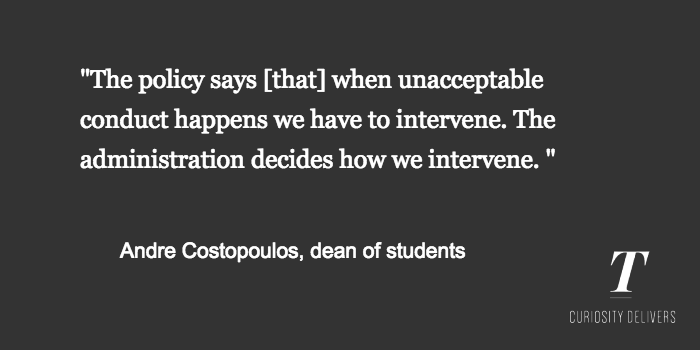On Feb. 16, McGill’s Sexual Assault Policy Working Group released its final version of the proposed Sexual Assault Policy (SAP) to the public. The working group formed in 2012, after allegations of sexual assault against against three former Redmen football players brought greater awareness to the fact that McGill has no university-wide sexual assault policy.
According to Cecilia MacArthur, a member of the working group, the SAP institutionalizes a lot of the informal practices that McGill had previously adopted, while additionally creating the new position of the sexual assault resource coordinator (SARC).
“The bulk of [the SARC’s] role will be just helping people navigate the policy, showing them the resources that exist,” she said. “The idea would be [that the Sexual Assault Centre of the McGill Students’ Society (SACCOMS) and the SARC] would work together and supplement each other, but that the SARC would be less of an immediate support person, understanding that sometimes, if you have an office of the SARC, people who are in crisis might go there, so […] ultimately, they’re probably going to have […] some crisis support training.”
According to Andre Costopoulos, dean of students, the potential hiring of a SARC is an implementation matter rather than a policy one.
“Some of the elements in the [SAP] [are] clearly implementation, and some of them are policy, and you have to separate the two,” he said. “The policy says [that] when unacceptable conduct happens we have to intervene. The administration decides how we intervene. How do we make sure that the spirit of this policy is respected in this community [….] That’s completely different to the policy conversation. Implementation is […] the university administration in partnership with the student associations.”
Talia Gruber, another member of the SAP working group, explained that the benefit of writing procedures into a policy was the policy’s permanence.
“Right now, we have a lot of things in the policy that [the McGill administration] would like to see in the implementation guide,” she said. “The reason that we want so many things in the policy is that policies are institutionalized and once they’re passed you can’t change what’s in them. We’ve come up with some really good compromises […] like putting things in the implementation guide, but having a caveat in the policy that says, ‘There is this guide, and it’s going to be used.’”
Costopoulos explained that other avenues of discussion between the working group and the McGill administration include the interpretation of a McGill Context, as outlined in Article 8 of the Code of Student Conduct. The current interpretation of the Article is that events held by student associations off-campus do not fall within the McGill context. Consequently, McGill will be unable to conduct a disciplinary investigation into any alleged sexual assaults that occur during such an event.
“It’s one of the points that we’ve been discussing and I think we’re going to continue to be discussing,” he said. “It’s a matter of how we’ve interpreted it over the years, and interpretations are always subject to revision because the context in which we live changes all the time.”
MacArthur explained that many individuals have been involved in shaping the SAP in the two years since its inception, include students, administration, faculty members, as well as campus groups.
“At a certain point last year, about March, we were considering […] bringing [the SAP] to Senate,” she said. “But […] stakeholders were feeling like we could do more consultation with regards to the anti-oppression aspect of the policy [….] At that point, we stopped the trajectory we had set out and started doing more consultation. [This February,] I think we felt like we had done as good of a job as we could of incorporating different experiences, [and] different approaches [into the SAP].”
Going forward, the SAP will be reviewed by members of the administration, including the dean of students and the office of the deputy provost (Student Life and Learning). Following any revisions to the SAP, the group hopes to tentatively present the policy to Senate this March.









